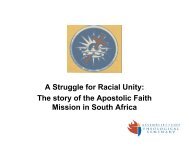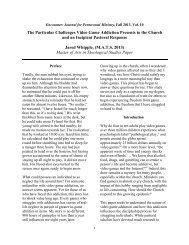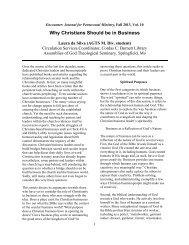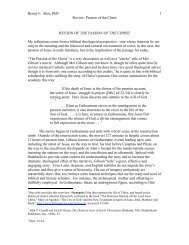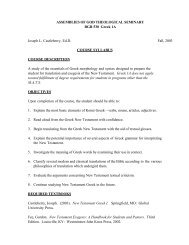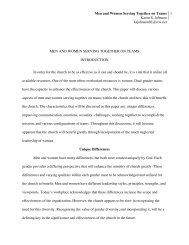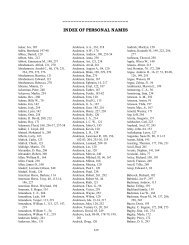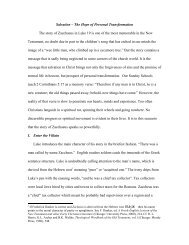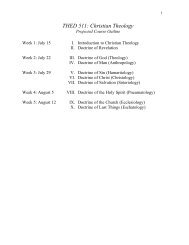Encounter: Journal for Pentecostal Ministry - Assemblies of God ...
Encounter: Journal for Pentecostal Ministry - Assemblies of God ...
Encounter: Journal for Pentecostal Ministry - Assemblies of God ...
Create successful ePaper yourself
Turn your PDF publications into a flip-book with our unique Google optimized e-Paper software.
in a certain direction is misguided to say the<br />
least. Hence, Gregory Boyd‟s thesis in The<br />
Myth <strong>of</strong> a Christian Nation deals with<br />
American evangelicals‟ fusion <strong>of</strong> the<br />
kingdom <strong>of</strong> <strong>God</strong> with the kingdom <strong>of</strong> this<br />
world through political involvement as<br />
nationalistic and political idolatry. 20 Further,<br />
Boyd clarifies some misguided notions:<br />
For some evangelicals [and <strong>Pentecostal</strong>s],<br />
the kingdom <strong>of</strong> <strong>God</strong> is largely about, if<br />
not centered on, „taking America back <strong>for</strong><br />
<strong>God</strong>,‟ voting <strong>for</strong> the Christian candidate,<br />
outlawing abortion, outlawing gay<br />
marriage, winning the culture war,<br />
defending political freedom at home and<br />
abroad, keeping the phrase „under <strong>God</strong>‟<br />
in the Pledge <strong>of</strong> Allegiance, fighting <strong>for</strong><br />
prayer in the public schools and at public<br />
events, and fighting to display the Ten<br />
Commandments in government<br />
buildings. 21<br />
Results <strong>of</strong> this presumptuous thinking are<br />
widespread. Boyd highlights five<br />
ramifications <strong>of</strong> this pervasive myth: (1) the<br />
myth increasingly harms global missions; (2)<br />
home missions are hindered because people<br />
are misled into thinking that their civil<br />
Christianity is real Christianity; (3) the<br />
church is damaged when believers misplace<br />
their trust in the wrong power; (4) as a result<br />
<strong>of</strong> believing the myth, some, intentionally or<br />
unintentionally, position themselves as moral<br />
guardians <strong>of</strong> society, believing it their<br />
duty/mission to preserve the moral fabric <strong>of</strong><br />
the nation; and (5) the myth creates the<br />
notion <strong>of</strong> America as a theocratic nation<br />
comparable to Old Testament Israel. 22<br />
The need <strong>for</strong> a new kind <strong>of</strong> political thinking<br />
is evident through the analysis <strong>of</strong> the<br />
abounding myths, misplaced trust, and bad<br />
theology. The following is a series <strong>of</strong><br />
proposals <strong>for</strong> a holistic <strong>Pentecostal</strong> political<br />
theology that takes seriously the effects <strong>of</strong><br />
empire on Christian thinking, the myth that<br />
America is a Christian nation, and the pitfalls<br />
<strong>of</strong> global market fundamentalism. An eclectic<br />
methodology has been used in terms <strong>of</strong><br />
borrowing portions from various authors and<br />
perspectives and, in that sense, I have not<br />
contributed anything new, but highlighted<br />
what I think is important <strong>for</strong> <strong>Pentecostal</strong>s to<br />
consider in developing a more thorough<br />
political theology. The proposals are all<br />
guided, however, by the fact that while the<br />
Christian faith impacts one‟s political<br />
decisions, believers are citizens <strong>of</strong> a<br />
pluralistic democracy. 23 Christians are first<br />
citizens <strong>of</strong> the kingdom <strong>of</strong> <strong>God</strong>, but are in the<br />
world. As Jesus prayed, “I do not ask that<br />
you take them out <strong>of</strong> the world, but that you<br />
keep them from the evil one” (John 17:15,<br />
ESV). 24 Thus, Christians must take seriously<br />
the fact that as citizens <strong>of</strong> the kingdom <strong>of</strong><br />
<strong>God</strong>, they also have responsibilities as<br />
citizens <strong>of</strong> a democracy.<br />
The Principle <strong>of</strong> Subsidiarity 25<br />
Given the fact that Christians are both<br />
citizens <strong>of</strong> the kingdom <strong>of</strong> <strong>God</strong> and the<br />
world, a dilemma faced since Jesus‟<br />
announcement <strong>of</strong> the kingdom and<br />
extensively dealt with early on in<br />
Augustine‟s City <strong>of</strong> <strong>God</strong>, Catholic political<br />
theology developed the principle <strong>of</strong><br />
subsidiarity. This principle notices that<br />
neither the Church nor government can solve<br />
all societal problems. Thus, the two must<br />
work together in partnership on social issues.<br />
Since 1931, when the principle was first<br />
introduced, a vital part <strong>of</strong> the idea has been<br />
that government should not replace the<br />
smaller <strong>for</strong>ms <strong>of</strong> community, including the<br />
church, because the church <strong>of</strong>ten remains<br />
closer and more connected and thus is better<br />
suited to aid the community. While the state<br />
should not absorb these smaller communities,<br />
they should provide assistance (subsidium)<br />
when the churches are unable to contribute to<br />
the common good. Most concisely, the<br />
principle states, “government is an important,



